This wonderful Cornish workshop and museum is dedicated to the legacy of studio pottery trailblazer Bernard Leach
Grayson Perry’s New Normal
Grayson Perry’s New Normal
2 Nov 2020
He’s hosted the cultural TV hit of the year; he thinks Covid has usefully trimmed the fat of a self-indulgent arts world; and he’s embracing uncertainty, without even bothering to don a frock. Welcome to 2020, according to Grayson Perry, says Jacky Klein.
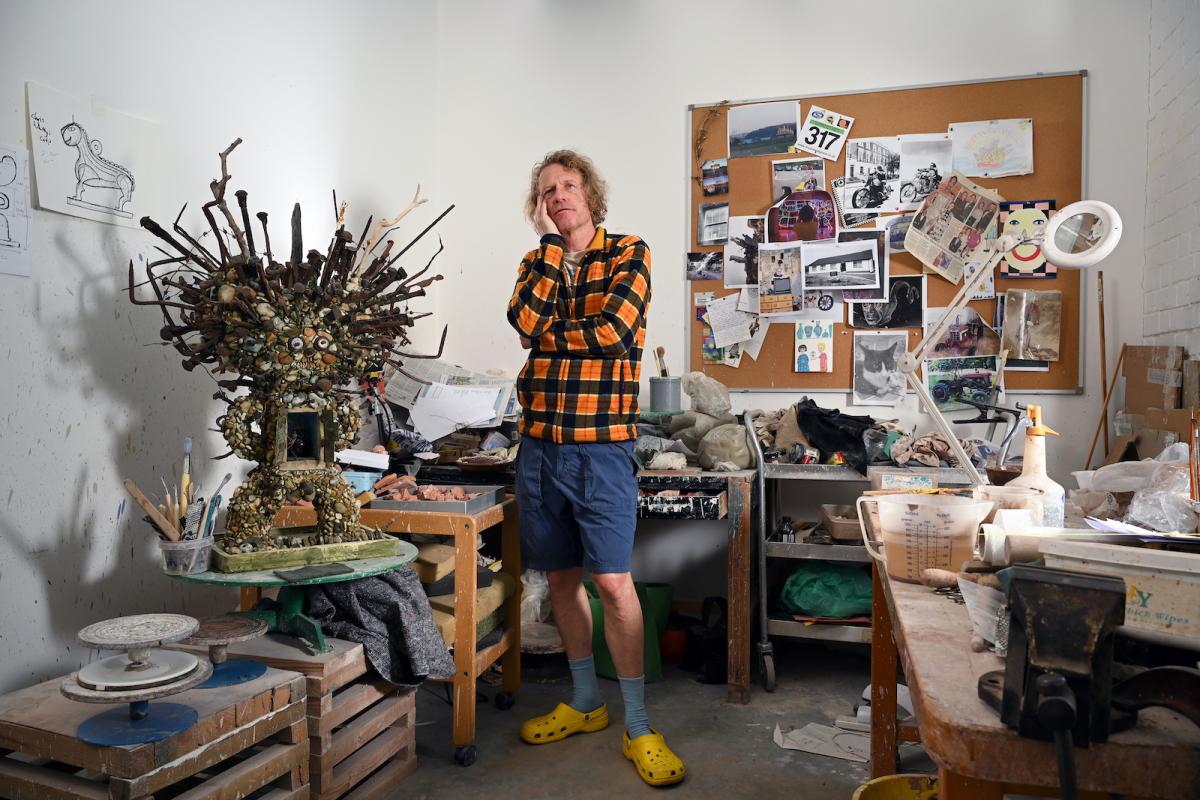 Photo John Millar
Photo John Millar
The date 24 March 2020 should have been a day of celebration at Grayson Perry’s Islington home. It was the artist’s 60th birthday, set to be full of friends, fizz, pizza and partying. Instead, it was the first day of lockdown in Britain, the official start to a year of cancellations and halted plans, all set against the grim backdrop of the Covid-19 pandemic. How did Perry feel about it? ‘Well, I must have had one of the earliest Zoom parties in Britain,’ he quips bleakly.
Perry – Turner Prize winner, flamboyant transvestite and TV presenter – prides himself on being something of a trendsetter. For four decades he’s zoned in on our social mores and habits, often sensing storm clouds brewing in the cultural weather (‘toxic masculinity’, ‘identity politics’) well before they hit land. The surfaces of his pots, prints, tapestries and sculptures are riddled with motifs from contemporary life – tax havens and supermarket lorries, refugee tents and Instagram addiction. Not everyone has appreciated his mordant, punning humour, more akin to the historic satirists Hogarth and Cruikshank than to the conceptualists of today. Now a Royal Academician and BBC Reith lecturer, with a CBE and Erasmus Prize to boot (his 2020 award postponed until the ceremony can take place without social distancing), Perry trod a long (and bumpy) road to success. His earliest works from the 1980s – on view at Bath’s Holburne Museum – look timid at a distance, but close up they mischievously stick two fingers up at propriety, replete with swastikas, sadomasochistic porn and men in frilly dresses.
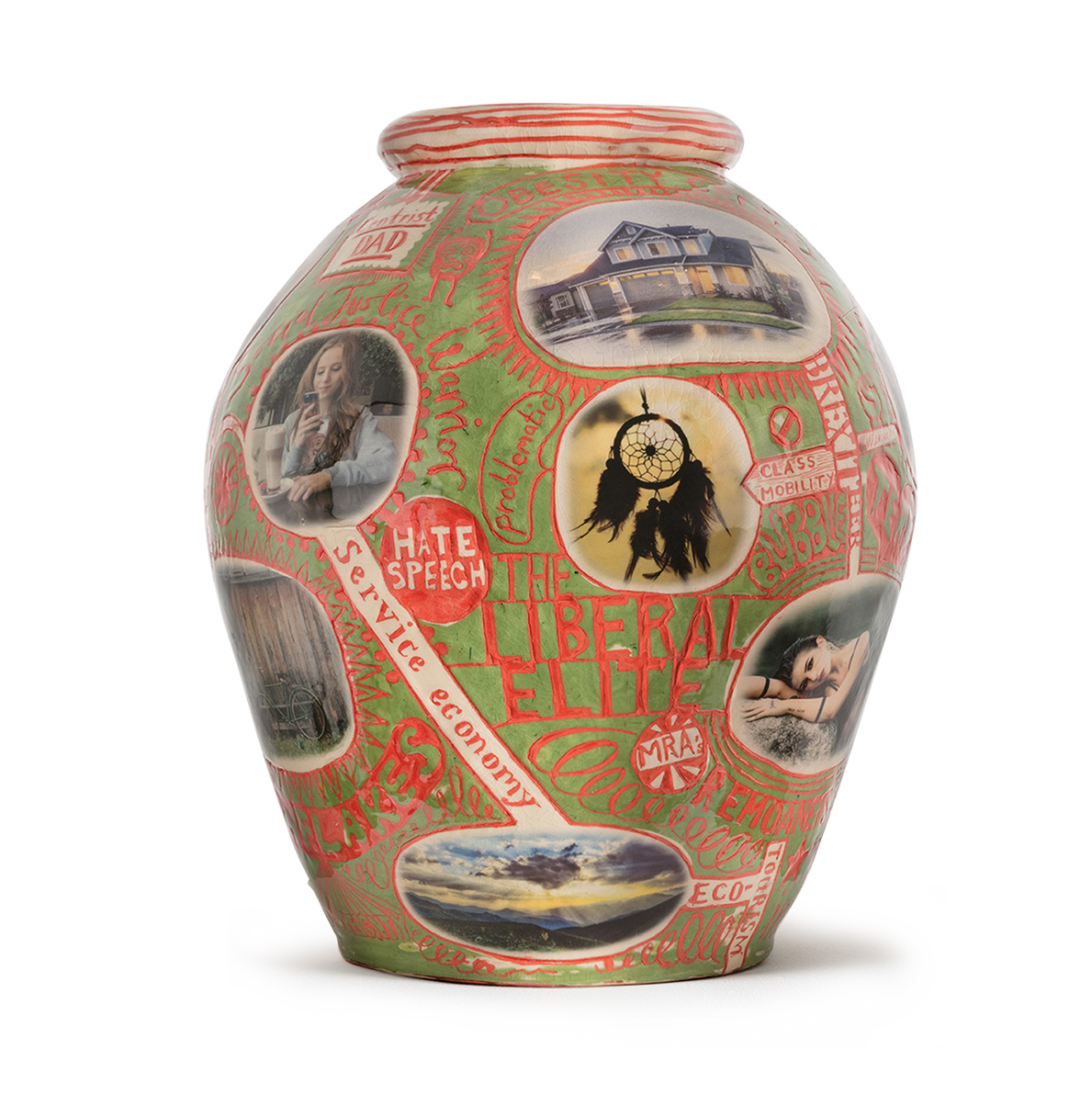 Empty Vessel, 2018, based, says the artist, ‘on all the clichés that crop up on social media’, Photo Angus Mill
Empty Vessel, 2018, based, says the artist, ‘on all the clichés that crop up on social media’, Photo Angus Mill
But even Perry’s usually joyful, ostentatious transvestism has been challenged in isolation. ‘I’ve only dressed up three times since March. I miss it, but I don’t have the motivation. It’s two hours’ work – a big effort. I’m getting older and I just can’t be bothered.’ Lockdown, by his own admission, accelerated changes already underway in recent years, including waning energy levels. ‘I can’t do three shifts a day any more,’ he admits. ‘The key is not to have ideas in the afternoon.’ Major aesthetic decisions are instead morning work; after lunch comes craft, or what he describes as ‘the mundane tasks – scrape, scrape, mould, mould – which I can coast through, without having to be super sharp.’
A shelf in the artist's studio. Photo John Millar
LOCKDOWN VIEWING
Despite having a bit less vim these days, Perry has had an extraordinarily productive year. By August, he’d already produced what would normally be a year’s output. An exhibition of new work is on at his London gallery; his latest TV series on America’s culture wars hit the small screen this autumn; a glitzy new stand-up show is planned for the spring. Perhaps his major success of the year has been Grayson’s Art Club, the hastily put-together but heart-warming Channel 4 series cooked up by his long-time director and friend, Neil Crombie, in which the public submitted artworks on weekly themes, from portraits to fantasy. ‘Neil recognised in early spring that people were about to be stuck at home with time on their hands – so why not encourage them to do something, to make art?’ The series followed Grayson and his psychotherapist wife Philippa around his north London studio as they themselves made art (in his case, a portrait plate, house planter, tea towel, and pots including We’ll Catch it on the Beaches, wittily conflating the Covid and Brexit crises). Celebrity friends popped up with their own work and whimsical titbits along the way.
‘IT’S A RIPE MOMENT FOR SOCIAL REVOLUTION. WHEN EVERYTHING’S UP IN THE AIR, IT MEANS THAT THE PIECES HAVE A CHANCE TO FALL DOWN IN A VERY DIFFERENT PATTERN’
Offering a liberal dose of humour, creativity, intimacy and community during the unsettling early weeks of the lockdown, the series was his most successful television venture yet, with regular audiences of over a million. An exhibition of selected artworks is hoped to be shown in a Manchester gallery, while a follow-up series has been commissioned for the new year. Why does he think it was such a hit? ‘Art Club was less about art and more about our relationship with ourselves,’ he reflects. ‘The reason for making art is no different for amateurs and professionals: it’s a communication between the artist’s unconscious and the viewer’s. Often that’s more potent with people who aren’t used to the process; a lot of things pop out in an artwork that the maker isn’t necessarily fully aware of.’
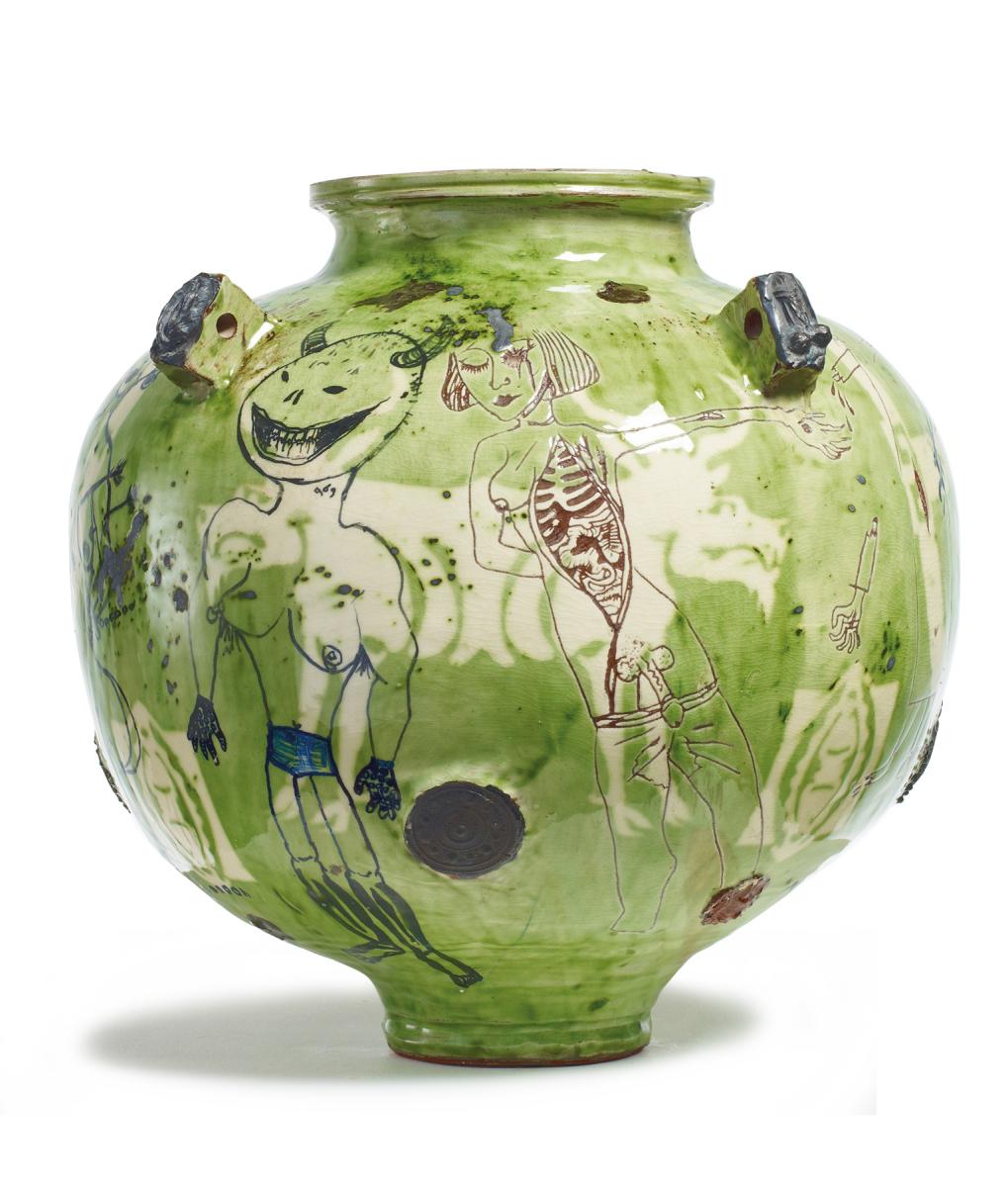 Design Based on Sketches by a Murderer, 1990. © Grayson Perry. Courtesy the artist and Victoria Miro
Design Based on Sketches by a Murderer, 1990. © Grayson Perry. Courtesy the artist and Victoria Miro
If the show provided a mental health lifeline for its contributors and viewers, it did much the same for Perry, who found lockdown a depressing and lonely time. ‘My cultural consumption went right down. I’ve hardly read this year. I tend to watch comforting, guilt-ridden telly. I’ve barely listened to Radio 4 because it’s all so miserable. For me, Art Club was six weeks’ distraction at the height of lockdown. It felt good to do it.’ As for the devastating effects of Covid on the cultural world – theatres and music venues closing, galleries struggling to survive – Perry has, as so often, an unconventional take.
‘IT’S AWFUL THAT THE CULTURE SECTOR HAS BEEN DECIMATED, BUT I THINK SOME THINGS NEEDED TO GO... WITH COVID, IT’S BEEN LIKE TURNING A COMPUTER OFF AND ON AGAIN, AND SEEING WHICH FILES REAPPEAR’
‘I think every part of life has probably got a bit of fat that needs trimming, a bit of dead wood,’ he suggests. ‘It’s awful that the culture sector has been decimated, but I think some things needed to go. Too often, the audience for culture is just the people making it – theatres with whole audiences of actors, or exhibitions only put on to impress other curators. With Covid, it’s been like turning a computer off and on again, and seeing which files reappear. Some of them we don’t really give a damn about. What’s interesting is what might not re-emerge.’
QUESTIONING IDENTITY
He sees other silver linings, too, in the restrictive measures that coronavirus has brought on. The environment has benefited, forcing a long-overdue readjustment in our consumerist, carbon footprint-heavy ways. ‘We don’t want to fly now; we’re all cycling. Greta Thunberg is wetting her knickers. Covid’s achieving all the things she wants.’ Less facetiously, Perry sees how it has focused minds more sharply than ever on social and racial inequality. ‘It’s put a lens on everything – zapping the contrast on all the injustices in society. The poor suffer more, the non-whites suffer more... It’s a ripe moment for social revolution. When everything’s up in the air, it means that the pieces have a chance to fall down in a very different pattern.’
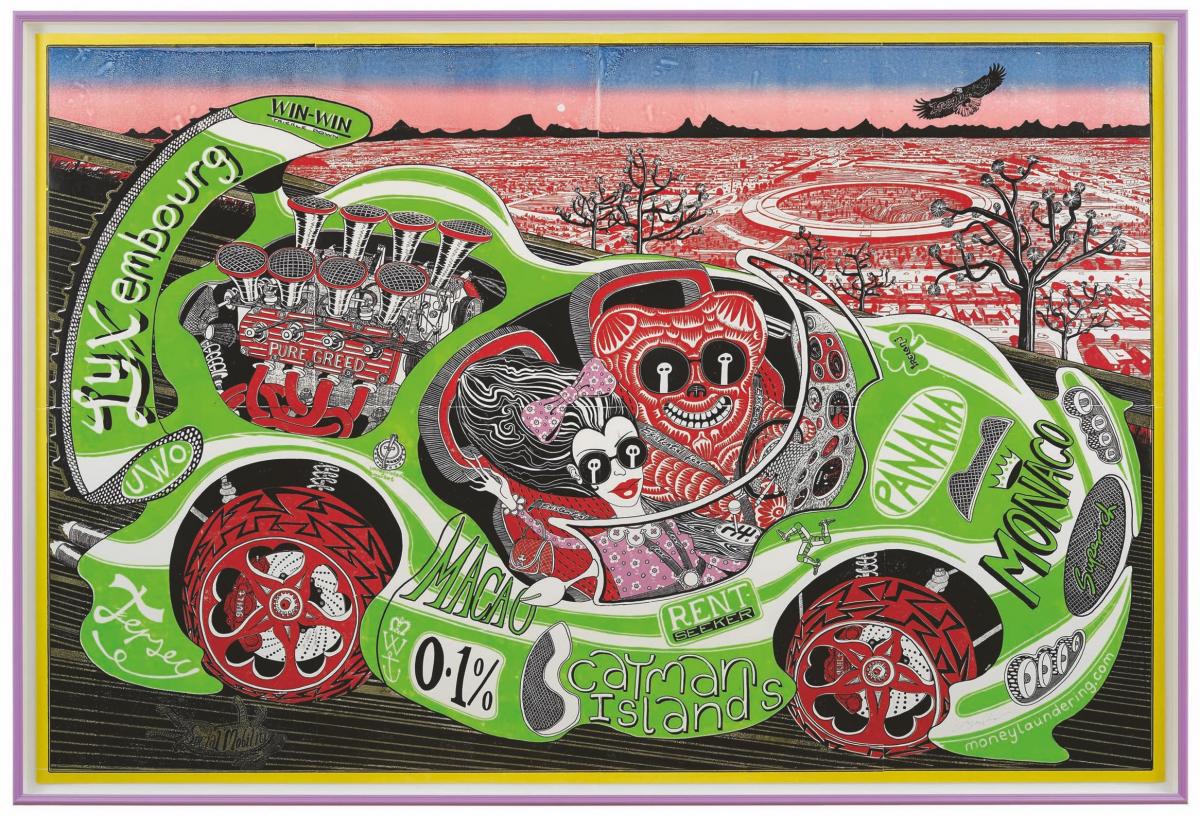 Sponsored by You, 2019, which alludes to the fact that ‘we’re the ones paying for these rich people who don’t pay enough tax’. Courtesy the artistand Paragon/ Contemporary Editions Ltd. photo: Jack Hems
Sponsored by You, 2019, which alludes to the fact that ‘we’re the ones paying for these rich people who don’t pay enough tax’. Courtesy the artistand Paragon/ Contemporary Editions Ltd. photo: Jack Hems
How are the pieces of his own life starting to settle? Perry does have a big new idea that he’s starting to play with, and it’s as close to home as ever: England. ‘I’m always interested in the default,’ he says. ‘White is a default, male is a default, and England is a default if you’re British. It doesn’t have the assertive breakthrough identity of Scotland, Wales or Ireland. Covid has highlighted that we are different nations in the most marked way. I’m sure it’s feeding the devolution arguments – but the question for the England that might be left is: who the hell are we?’
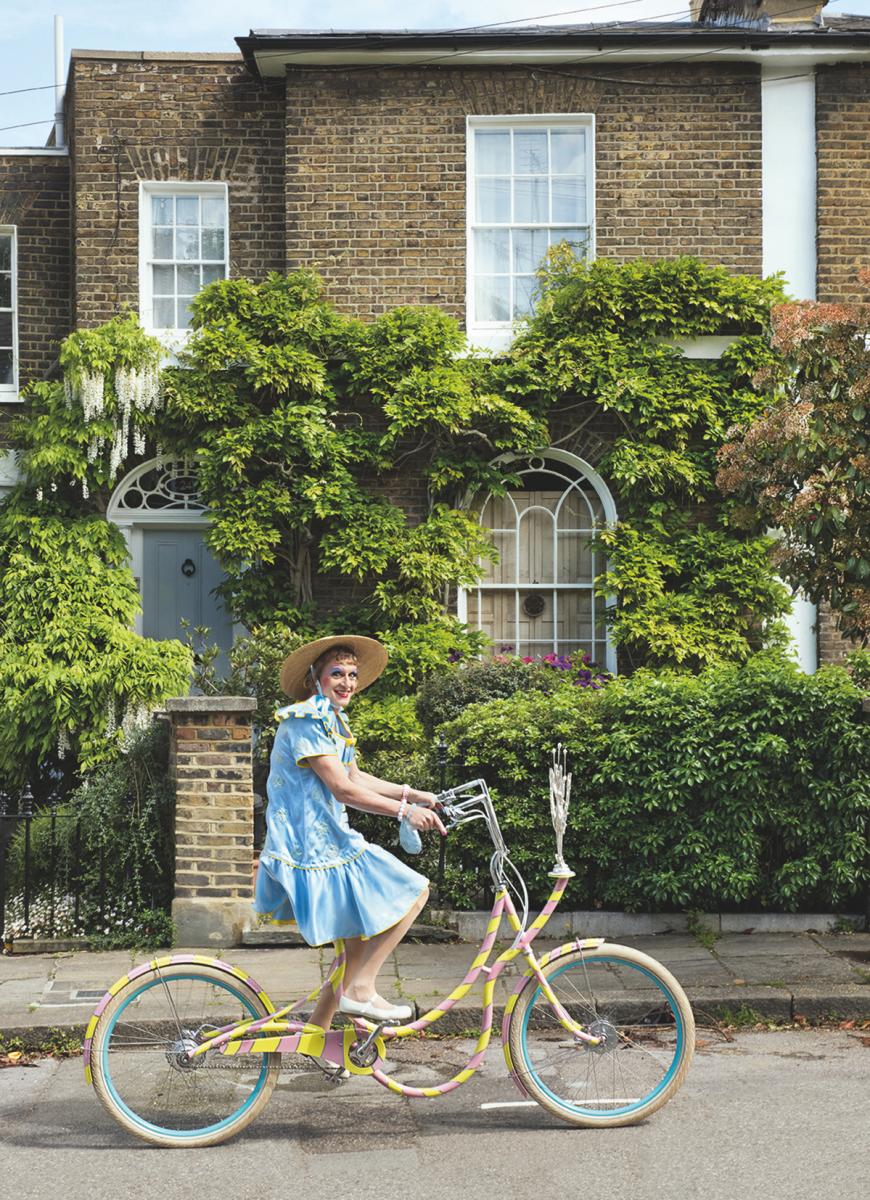 ‘Bicycles are the future...’; Perry on his 2017 custom-made Princess Freedom Bicycle, 2017. Photo: Thierry Bal
‘Bicycles are the future...’; Perry on his 2017 custom-made Princess Freedom Bicycle, 2017. Photo: Thierry Bal
If you want to know where this existential line of thought is heading, you may be in for a wait. The future is uncertain, even for an A-list artist who’s usually scheduled up for years; long-term planning has been one of the casualties of 2020. ‘The nature of creating culture is that you’re making someone else’s nice day out in two or three years’ time, so I’ve lived completely in the future,’ Perry recognises. ‘Now, after the end of this year, I’m not quite sure what’s happening.’ And that uncertainty has changed how he works, too. ‘It’s made me fall back into making art in the way I did when I was young. You make it for yourself, now, with no idea about where it might be exhibited.’ Doubt, of course, can be productive, and open-endedness may be a good thing for an artist whose work has been increasingly woven into the complex demands of museums and TV production companies. ‘Uncertainty has always been a creative kick for me. How can I make work in a way that exploits the current situation, that fits into the “new normal”?’ There’s no doubt Perry will rise to the challenge. As he argues, ‘It’s what artists have got to do.’
SEE
Grayson Perry: The Vanity of Small Differences, Newlyn Art Gallery and The Exchange; until 2 January 2021; newlynartgallery.co.uk
Grayson Perry: The Pre-Therapy Years, The Holburne Museum, Bath; until 3 January 2021; holburne.org
Grayson Perry: The Tomb of the Unknown Craftsman, his memorial to the unknown craftsmen and women who made some of the wonders of history at The British Museum; until January 2021; britishmuseum.org
READ
Grayson Perry (updated and expanded edition) by Jacky Klein, published by Thames & Hudson; thamesandhudson.com
CATCH UP ON
Grayson Perry’s Big American Road Trip, available on All 4
This feature appears in the winter issue of The Arts Society Magazine, available exclusively to Members and Supporters.
Stay in touch with The Arts Society! Head over to The Arts Society Connected to join discussions, read blog posts and watch The Arts Society at Home - a series of films by Arts Society Accredited Lecturers, published every fortnight.
About the Author
Jacky Klein
JOIN OUR MAILING LIST
Become an instant expert!
Find out more about the arts by becoming a Supporter of The Arts Society.
For just £20 a year you will receive invitations to exclusive member events and courses, special offers and concessions, our regular newsletter and our beautiful arts magazine, full of news, views, events and artist profiles.
FIND YOUR NEAREST SOCIETY
MORE FEATURES
Ever wanted to write a crime novel? As Britain’s annual crime writing festival opens, we uncover some top leads
It’s just 10 days until the Summer Olympic Games open in Paris. To mark the moment, Simon Inglis reveals how art and design play a key part in this, the world’s most spectacular multi-sport competition



